6 Powerful Psychological Tactics to Influence Customers & Sell How Bonobos Rocks the Psychology of Selling
Apr 19, 2018
posted on:
I recently finished reading Robert Cialdini’s Influence diving into the 6 factors of influence & the psychology of selling. My girl, Megan Martin, recommended it, so I knew in an instant it would be worth a look.
These were always things I generally knew about… but never knew they had an actual name.
After blowing my mind… it shined a light on all those ways I’ve been sucked into swiping that credit card. I’ve been getting influenced & sold to ever since I was old enough to to know that I needed that Princess Diana exclusive Beanie Baby.
This book was like the clouds parted revealing 6 key factors on how you can sell more effectively to your audience without feeling salesy.
Since then, I’ve seen them everywhere.
I catch them during phone calls from my college asking for donations, in email marketing from big brands & small biz alike, and even in Instagram Stories on the reg.
The interesting thing? These factors of influence can be taken advantage of & twisted for negative use… or they can be utilized to sell well & with honor & dignity, educating your people about your product & sharing why it’s the best fit for them. I opt for the latter option, and if you’re here, I bet you do too.
But how do we know we’re using the factors of influence for the right reasons & in the right ways?
One of my favorite ways to get inspired about how I can apply new concepts to my business is by analyzing how some of my favorite big brands do it best… the ones who have entire departments dedicated to this stuff…
So today, I pulled together a round-up of how one of my favorite clothing brands for my husband, Bonobos, is using each of the 6 factors of influence to connect with & convert their audience & make a sale.
To give you an idea, in the book, Cialdini covers the following:
The Psychology of Selling & Influence
- Liking
- Social Proof
- Scarcity
- Reciprocation
- Commitment & Consistency
- Authority
And Bonobos rocks at every one.
Get a peek at some of my favorites ways they use these factors to get you to pop on over to their site or store & buy buy buy!
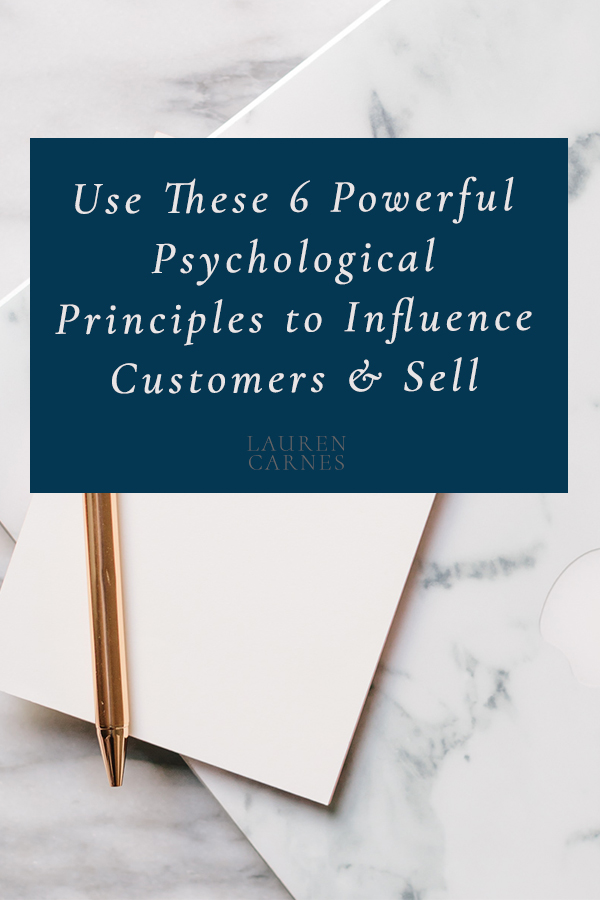
Liking
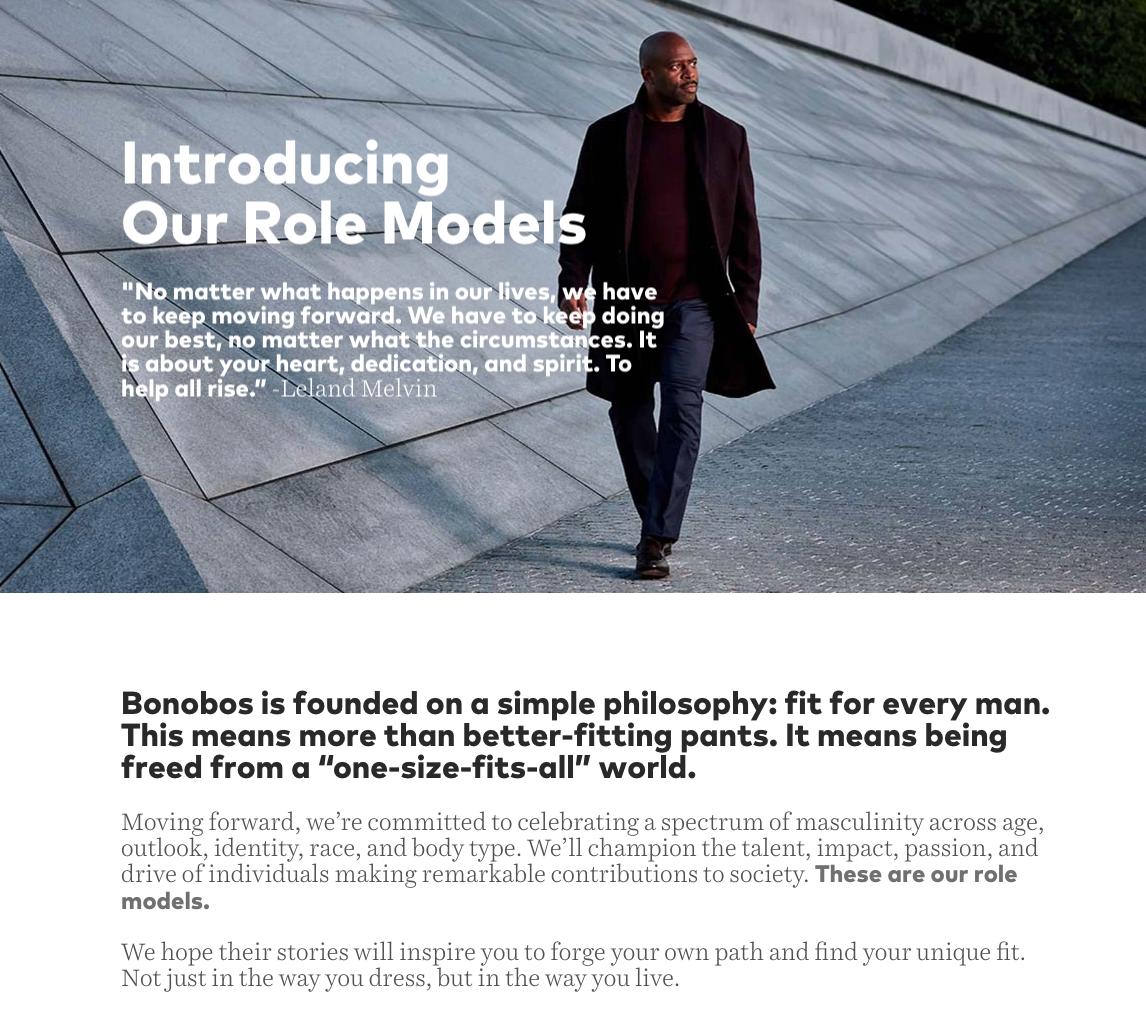
You’ve probably heard about “know-like-trust” a time or two in business. “Liking” employs the principle that you’re more likely to say yes to a request from someone we know & like than someone we don’t. Someone we connect to… we relate to… and even can see a bit of ourselves in. That’s why storytelling is so key in business & sales. Bonobos employs “Liking” in a super unique way (one that actually started this whole obsession when Chip received their catalog in the mail one afternoon).
Instead of “Male Models” – Bonobos uses “Role Models” and their stories & styles to share about the brand and products. With a connotation of “Role Models” being someone you look up to and want to emulate, Bonobos immediately triggers emotions of Liking with their marketing. We hear the Stories of the Role Models & how they style their Bonobos, and are primed to buy not only because we like the people (and the brand), but because who better to trust than a “Role Model?” From careers of chefs to journalists to founders, there is a Bonobos fit for every Role Model, and for every man. And there’s a fit for you… (or your significant other or brother or dad or best friend…).
Takeaway: Content is king… but connection is also king. Building your business on a basis of connection & sharing stories increases “Liking” and makes it easier to ask for a sale. Plus, you’ll immediately feel as though you’re building a relationship with your client & have their best interests in mind instead of just looking for a transaction. And finally, we all like to buy from people we actually like… & do business with people we trust. Oh, and one last thing, these Role Models also provide an element of Social Proof… which leads me to…
Social Proof
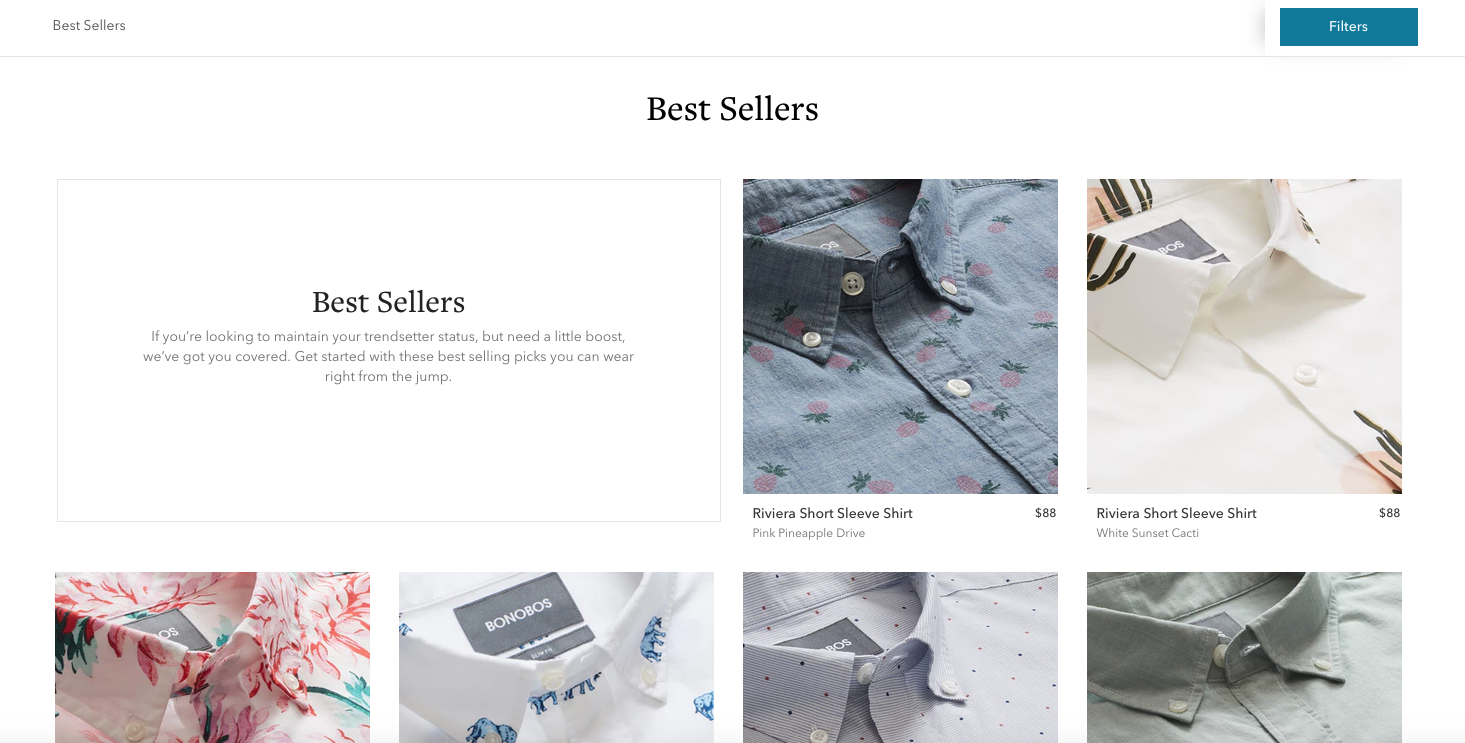
Social proof says you’re more likely to like something (and buy!) if other people like you do too. And so if you want to keep being a “trendsetter” then you must get these Best Sellers… or else you might miss out on the trend all together. After all, they are Best Sellers, aren’t they?… so they could be gone before we know it! You’ll find social proof used in other principles as well – it bolsters just about any Influence tactic if used correctly.
Takeaway: Take a hint from Bonobos & highlight your most popular products & services to make the decision easier for potential clients. With so many options, it’s hard to choose, but if you know others made the decision & are pleased with it, then there must be a reason, right?!
Scarcity
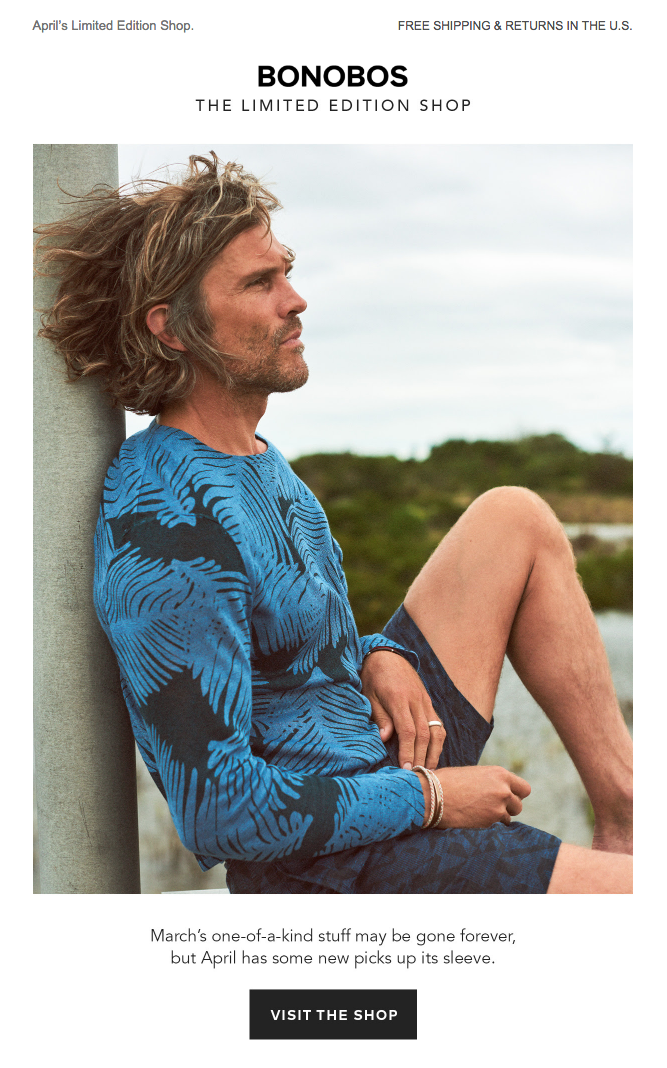
Limited edition. One-of-a-kind. Gone forever. Aka… can’t get it anywhere else & if you don’t buy now, you’ll never be able to get it again. Scarcity is a powerful thing, my friends, because we want what we can’t have, and want it even more when we think we might miss out on something. FOMO, anyone? And what’s even better… Bonobos has a tab on its site where you can find the “Limited Edition” items alongside my other favorite… the “Best Sellers.”
Takeaway: What in your brand is “Limited Edition” or only available for a limited time only? Incorporating deadlines & speciality soon will be “gone forever” products is a huge motivator to hit “buy now!” before time (or supply!) runs out.
Reciprocation
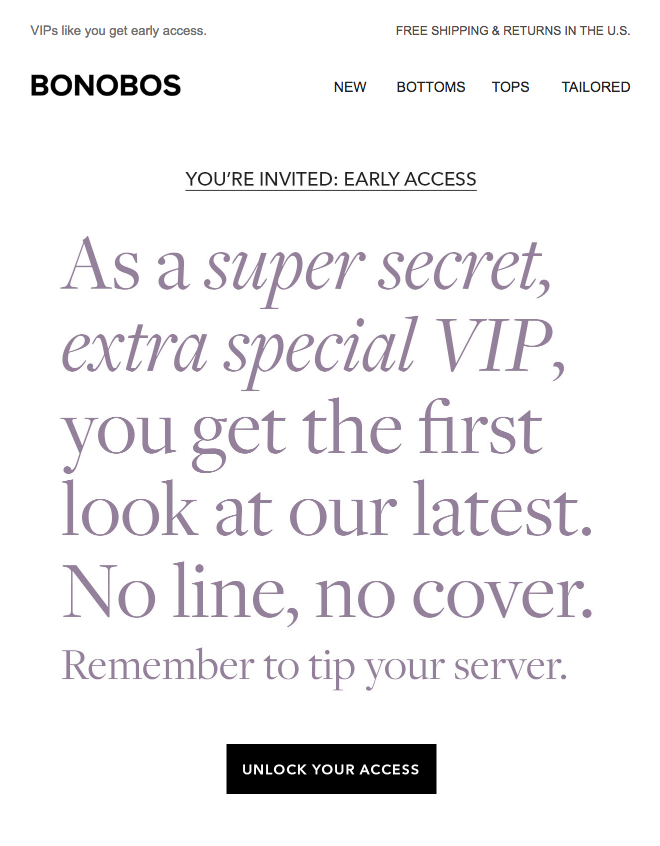
Bonobos offered me 20% off my first purchase by sharing my email address. Not only is that a smart marketing tactic, because it means they get access to the ever coveted inbox, but they also made great use of one of my favorite factors of Influence: Reciprocation: where we feel compelled to give something in return when someone gifts us with something first. They give 20% off? I give $$$ for a purchase to use said discount…
But now with my email, they’re able to continue offering me exclusive (hey, scarcity!) super secret VIP opportunities that no one else has… with “no line, no cover.” No covers to pay = $$$ in my pocket… which means, subconsciously, Bonobos just gave me a special gift of Early Access & “$ saved.” And you better believe I clicked that “Unlock Your Access” button… because I felt compelled to give them a little something back after they made such an effort to give me something. After all, “Remember to tip your server.”
Oh, one more favorite: When you walk into their Guideshop locations and begin trying on product, they offer you a cold brewsky. Talk about meeting your ideal client where they are… and a good bit of Reciprocation at play while they’re at it!
Takeaway: What can you give your potential client as a “gift” up front to trigger the principle of reciprocity? Perhaps it’s an opt-in freebie on the first 5 things to do when planning your wedding… or a free 15-minute Discovery Call to connect before a coaching session… or even an extra something in your shipment as a little thank you & to prompt your customer to share on social media (yep, there’s social proof again!). Either way, I promise you have something to give… and I promise if you do it with good intention, you’ll find you “get” as well!
Commitment & Consistency
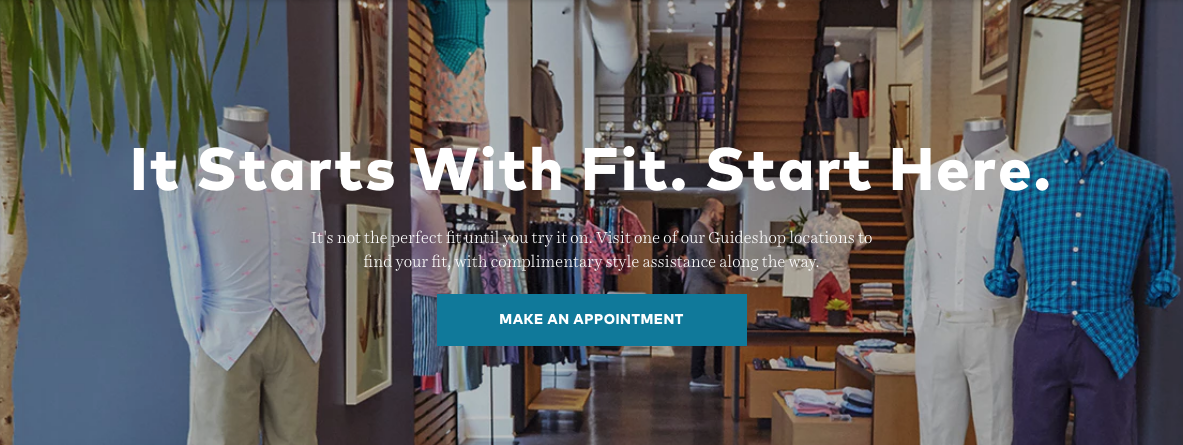
“It’s not the perfect fit until you try it on.” Online shopping can be tough… even for the most seasoned of millennials. But touching, seeing, experiencing something in person… not only is that a version of “sampling” aka reciprocation, but it also brings about another factor of influence: Consistency. Consistency means that people will do anything in their power (even when it may not be rational) to stick to what they say they will do. Consistency means we don’t have to expend the mental energy to weigh the pros & cons… instead, when we commit to something, we know exactly what we need to believe, say, or do when asked to move forward.
At the Bonobos Guideshop, you actually can’t walk out with clothing. Yup, you heard that right. You don’t buy in store. Instead, you experience the brand in its entirety and get complimentary style assistance along the way. You can buy online, but if someone’s hesitant about WHAT to buy, walking in the Guideshop shows a level of commitment that means you’re ready to find “the perfect fit.” And once you try it on, there’s no turning back… because you’re sold. Not just on the product & experience, but on the commitment to find a fit that works for you.
And great news: Shipping. It’s fast as a ninja. Returns? Always free. So there’s little barrier to entry… and once you get that perfect fit in your hands at home, you’ve already committed to keeping it (or can always exchange it without a single bit of hassle…).
Takeaway: Thinking of launching a new product or service? Ask in advance before you launch if people would be interested in getting access to it… even if you know they would be. Their commitment (especially publicly – in comments, IG Polls, etc.) means they’re likely to be more consistent down the road. After all, they’ve already made the decision that it’s worthy of their investment the first time around.
Authority
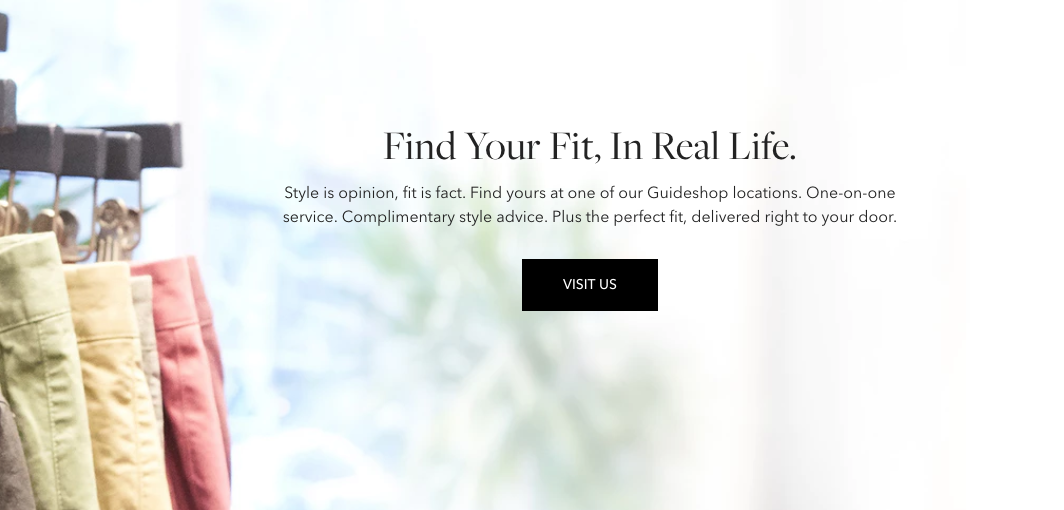
We respond to authority figures. It’s just who we are. And Bonobos is the authority in “Better-Fitting, Better-Looking Men’s Clothing & Accessories.” So when they say “Style is opinion, fit is fact.” I believe them. They know fit. And if I am in the Guideshop and the person providing one-on-one service tells me my exact fit, I’ll take it as fact. In fact, I should trust not only their facts, but also their opinions, as they are the experts… AND they’re providing me with “complimentary style advice.” They are the expert stylists, as well… one more fun fact: in the same Featured section on the website as the Best Sellers and Limited Edition is the “Editor’s Picks” – a curated list of all the items the stylish man needs for his wardrobe. And the Editor knows all the products, so therefore, he certainly is the expert on what we should be buying! I’ll trust that authority, thanks.
Takeaway: People are more inclined to hire you if they see you to be the “expert” in your field. Whatever you’re selling, ensure that you showcase your expertise on the topic. Blogging is a great way to showcase what you know about your industry & that you’ll serve clients well as a result. Whether it’s through highlighting articles you’ve been featured in elsewhere as the expert, or even in your title of: Founder or CEO of your business… you can portray Authority in a number of ways… especially if Social Proof is involved! 😉
All that’s to say: Selling doesn’t have to feel skeazy… in fact, when you employ psychological principles like these 6, it’s a natural function of how we as humans respond to opportunities in front of us… and means that when presented to the right person at the right time, you have the potential to add a whole lot of value to your customer and a whole lot of dough to your bank account.
So tell me:
I’d love to hear one way you’ve seen one of these tactics used by one of your favorite brands! Comment below!